Socio-economic uplift of Gwadar imperative for CPEC success
Two-day media conclave and roundtable conference reviews CSR projects, socio-economic development under CPEC
KARACHI:Without bringing the people of Gwadar and surrounding areas out of the extreme poverty, China-Pakistan Economic Corridor (CPEC) – the multibillion-dollar project dubbed as the game changer for Pakistan and the region – would never truly be considered a success.
It is imperative that all stakeholders should devise a mechanism for an integrated socio-economic development strategy according to the hopes and aspirations of the inhabitants of Gwadar – a small port city of strategic importance located on the southwestern coast of Balochistan – in connection with CPEC.
The ongoing initiatives in the domain of Corporate Social Responsibility (CSR) undertaken by China Overseas Ports Holding Company (COPHC) and other Chinese firms in Gwadar are appreciable. However, effective development communication and positive engagement with local communities is critical for the effectiveness and long-term success of these projects.
This was the gist of a two-day media conclave and roundtable conference titled ‘CSR Initiatives in Gwadar (The Gateway to CPEC)’, co-organised by Institute of Policy Studies (IPS) Islamabad and the University of Gwadar in collaboration with COPHC, Gwadar Port Authority (GPA) and Gwadar Development Authority (GDA), held on Thursday, May 19 in the strategic port town.
CSR (corporate social responsibility) is an emerging concept and refers to practices and policies undertaken by corporations intending to have a positive influence on the local community where they operate.
In Pakistan, the Securities & Exchange Commission of Pakistan (SECP) promulgated the Companies (Corporate Social Responsibility) General Order in 2009 to prescribe descriptive and monetary disclosures of CSR activities undertaken by the companies. The law provided an impetus for all the public companies to undertake charitable and philanthropic activities to the benefit of their customers, suppliers, employees, shareholders, communities, and all the other stakeholders.
In 2019 alone, the corporate sector spent Rs16 billion in CSR activities throughout the country.
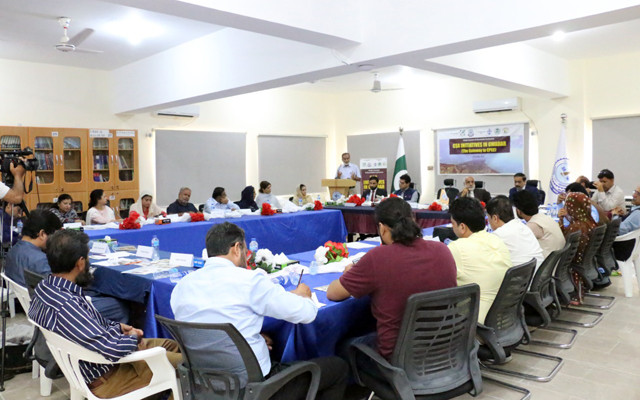
Speaking to media representatives at the roundtable conference, Gwadar Port Authority (GPA) Chairman Naseer Khan Kashani stressed the importance of bringing the locals together through CSR initiatives.
He said Gwadar Port was the flagship project of CPEC without which the multibillion-dollar initiative cannot materialise. “However, we must prioritise people over infrastructure development. Drinkable water and electricity is the top priority of the authorities in Gwadar,” he stated.
Kashani said a desalination plant of about 1.2 million gallons would become operational in six to eight months that would provide drinkable water to the locals.
Moreover, the newly inaugurated state-of-the-art Pak-China Vocational & Technical Training Institute will provide three years’ training to local youth, which is a big contribution by our Chinese friends, he added.
“Chinese authorities have also recently provided 3,000 solar panels to the poorest of the poor in Gwadar for the provision of electricity,” he informed.
The GPA chairman however stressed the initiatives will start to pay dividends in 15 years like such projects do across the world.
While delivering the keynote speech, Zhang Baozhong, Chairman COPHC spoke at length about the experiences of his seven-year stay in Gwadar.
“We are cognisant of the fact that Gwadar deserves more rapid development to live up to the expectations of the local people. There is no denying the fact that it has developed much during the past seven years,” he remarked.
He stated three reasons for the promising prospects of Gwadar: the cooperation of the Gwadar people, its vast resources, and its strategic location.
“The inhabitants of Gwadar deserve respect and development according to their rightful demands,” Chairman Bao underscored.
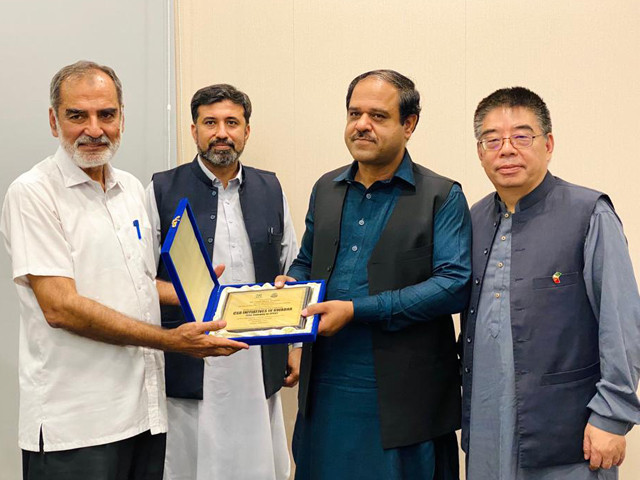 IPS Chairman Khalid Rahman presenting a memento to Jawad Akhtar Khokhar, advisor, maritime affairs, Ministry of Planning, Development & Special Initiatives. PHOTO: EXPRESS
IPS Chairman Khalid Rahman presenting a memento to Jawad Akhtar Khokhar, advisor, maritime affairs, Ministry of Planning, Development & Special Initiatives. PHOTO: EXPRESS
Speaking on the occasion, Shahzad Sultan, the country head marketing of COPHC, provided the company’s investment details as well as its contributions for the welfare of residents of Gwadar and surrounding areas.
COPHS, he said, has invested $50 million for the port development and $250 million for the development free-zone area thus far. More than 46 enterprises including banks, warehouses and businesses relating to fishery, edible oil and petrochemical among others have been enrolled so far, he added.
He said the port has three multipurpose jetties, providing better and quicker berthing facility for vessels than Port Qasim and Karachi Port Trust (KPT).
“We are sending 20 students to China on scholarships every year. We have been running a primary school here for the last five years and soon we will also construct a secondary school. More than 6,000 solar panel units have been distributed among the people of Gwadar so far, and around 500,000 trees have been planted,” Sultan informed while providing details of the company’s CSR initiatives.
IPS Chairman Khalid Rahman highlighted the concept of CSR and elements that can improve the lives of the local inhabitants.
“We must have solution-oriented recommendations, not problem-oriented,” he said, adding that positive thinking and improvement in governance will bring a huge change in the life of the people of Gwadar.
“CSR activities do not mean spending a share of your profit, it’s about creating an environment which is not harmful for the society in any way,” he added.
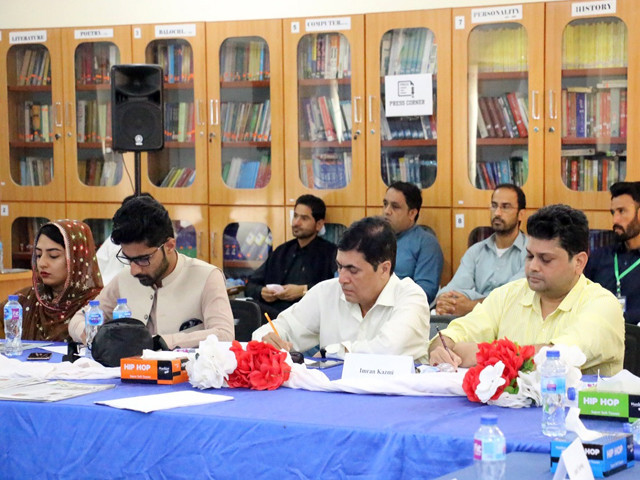
Professor Dr Abdul Razzaq Sabir, Vice Chancellor University of Gwadar, in his welcome address earlier appreciated the initiatives of IPS for identifying challenges in the area.
He said giving back to the society is the biggest responsibility of corporate sector. “Working on development of human resources should be the biggest priority of the government and private sector. As Gwadar is expanding after development of the port, it is important to learn from China’s experience and expertise through student exchange programmes. “We must train our youth to become productive elements of Gwadar.”
He was of the view that CSR must be defined in local perspective. Local issues could be considered to resolve people’s genuine and basic issues and problems through CSR initiatives.
Dr Sabir emphasised that engaging local community and civil society could result in better planning, befitting solutions and better implementation with local wisdom and participation.
Dr Rashid Aftab, director Riphah Institute of Public Policy (RIPP) commented that reservations of locals must be addressed with evidence-based data sharing with all relevant stakeholders. And for this the University of Gwadar can play a big part, he added.
Jawad Akhtar Khokhar, advisor, maritime affairs, Ministry of Planning, Development & Special Initiatives, earlier gave a detailed overview of the development projects in Gwadar under various modalities and highlighted that the CPEC projects in Gwadar worth $2.1 billion thus far.
He said so far three projects worth $314 million have been completed. These projects included Gwadar Smart Port City Master Plan, physical infrastructure of Gwadar Port and Free Zone Phase-1, and Pak-China Technical and Vocational Institute. Another seven projects worth $1.44 billion are under implementation process, he said. These projects include Eastbay Expressway, which is 98 per cent completed; facilities of fresh water treatment, water supply and distribution, which are 70 per cent completed; New Gwadar International Airport; Pak-China Friendship Hospital Gwadar; infrastructure of Gwadar Free Zone Phase-II; 300 MW coal power plant and 1.2 million gallons’ desalination plant.
Khokhar said under the short-term strategy the prioritised projects include provision of water in three months and electricity in five months for Gwadar, Trading Corporation of Pakistan has been authorised to import one-third cargoes at Gwadar; and completion of M-8 motorway.
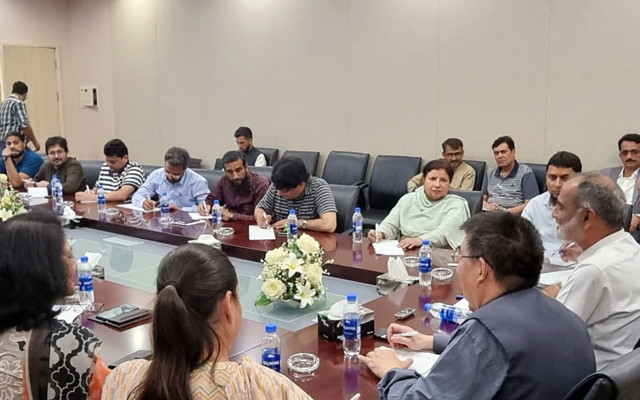
Highlighting long-term strategy, he said the government is aiming to build LNG and POL terminals at Gwadar port as well as ensuring availability of electricity, water and gas to enable phase-2 expansion of the port.
Dolat Khan, Registrar, University of Gwadar and Arsalan Ali, Head of Investments, Gwadar Development Authority also spoke on the occasion.
The media conclave and roundtable conference was attended by a number of senior journalists and academics from Karachi, Islamabad and Gwadar. The delegates also visited China-Pakistan Vocational and Technical Training Institute and other sites under CSR to witness the pace of progress. They interacted with the local students and teachers to observe their views.
Local journalists and activists, who also attended the conference, expressed concerns over the slow pace of development projects for the local community.

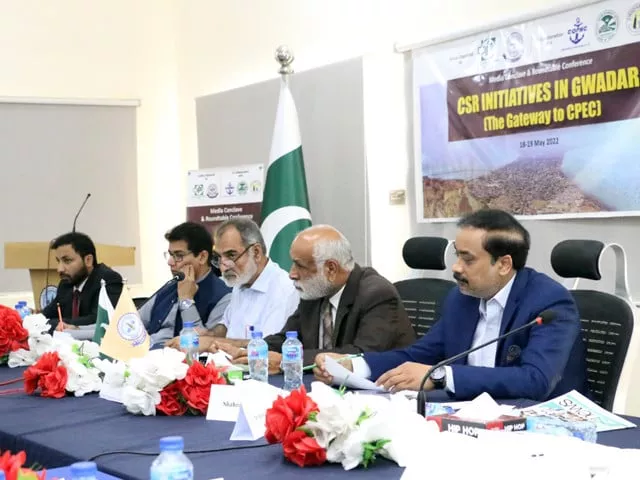
COMMENTS
Comments are moderated and generally will be posted if they are on-topic and not abusive.
For more information, please see our Comments FAQ